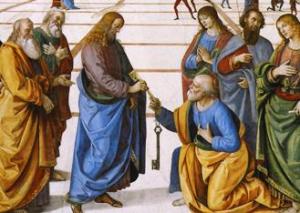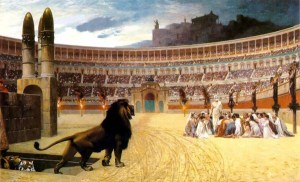5th Sunday of Ordinary Time
By Fr. Victor Feltes
The oldest known depiction of St. Paul the Apostle, a fresco from the Catacomb of Saint Thekla in Rome dated to the 300’s A.D.
St. Paul is one of history’s greatest saints. Today I would like to talk about his vision, his preaching, and his early church communities. But what I would like show you (for your benefit) is that his vision, his preaching, and his early Church communities were not as perfect as you probably imagine.
First of all, St. Paul had vision problems. I do not mean anything was wrong with his inspired Christian insights, but that his physical ability to see was limited. When he beheld the glorified and risen Jesus on the road to Damascus, an intense light shone from the sky around him. Paul got up from the ground and opened his eyes but he could not see anything. After three days, our Lord sent a Christian named Ananias to prayerfully lay his hands upon him. “Immediately, things like scales fell from his eyes and he regained his sight.” Yet issues with Paul’s vision seem to have lingered or later reemerged. While writing to the Christians of Galatia more than a decade after his conversion, St. Paul recalls, “You know that it was because of a physical illness that I originally preached the gospel to you.” He does not directly identify his malady, but he observes, “Indeed, I can testify to you that, if it had been possible, you would have torn out your eyes and given them to me.” And in closing this letter to the Galatians, Paul writes, “See with what large letters I am writing to you in my own hand!” These clues suggest that swapping-out his eyes for another pair would have improved Paul’s poor and ailing eyesight.
Another historical detail few notice about St. Paul is that his letters were apparently more impressive than his public speaking abilities. In his second letter to Corinth, St. Paul addresses criticisms about himself, noting “someone will say, ‘his letters are severe and forceful, but his bodily presence is weak, and his speech is contemptible.’” Paul acknowledges in today’s second reading that he met the Corinthians and proclaimed the Gospel to them without “sublimity of words or of wisdom.” “I came to you,” he writes, “in weakness and fear and much trembling, and my message and my proclamation were not with persuasive words of wisdom…” By God’s grace, his preaching did bear fruit, but Paul’s writings came across as being more eloquent and powerful.
A third overlooked aspect of St. Paul’s life is that the Christian communities he led were far from perfect. People often think of the early Church as a golden age. We lament the Catholic Church’s present problems and idealize her past. Yet throughout his New Testament letters, St. Paul is constantly correcting the early Christians’ beliefs and behaviors. Consider the Church at Corinth. Paul admonishes those Corinthians for their pride, for their internal divisions, for their liturgical abuses, and for their toleration of “immorality of a kind not found even among pagans.” Early Christian communities had real issues, and St. Paul did not find it easy to pastor them.
So to recap, St. Paul’s health was not perfect, his human talents were not perfect, and his parishes were not perfect. And yet, neither his poor health, nor his uneven talents, nor the problems within the Church prevented St. Paul from faithfully bearing everlasting fruits. I wanted to highlight the weaknesses and imperfections of St. Paul and the early Christians to help us appreciate that our circumstances are not so different today. When Jesus Christ declares, “You are the salt of the earth,” and “You are the light of the world,” he really is talking about us too. Our Lord would do great and important things through you, and the good you are doing now does more good than you know. So carry your burdens, endure your trials, and keep the Faith like St. Paul did. As Jesus once said to console St. Paul in his struggles, “My grace is sufficient for you, for power is made perfect in weakness.”


 Though children are small and weak, Jesus says, “See that you do not despise one of these little ones, for I say to you that their angels in heaven always look upon the face of my heavenly Father.” They have no wealth or worldly power, but Jesus says, “Unless you turn and become like children, you will not enter the kingdom of heaven.” Jesus, calling a child over and putting his arms around it, says, “Whoever humbles himself like this child is the greatest in the kingdom of heaven.” Jesus says that children are to be treasured and loved like himself: “Whoever receives one child such as this in my name receives me.” Jesus says, “Let the children come to me, and do not prevent them; for the kingdom of heaven belongs to such as these.” In just the same way as a good shepherd hates to lose even one of his many sheep, Jesus says, “it is not the will of your heavenly Father that one of these little ones be lost.” Indeed, ‘Jesus loves the little children, all the little children of the world.’
Though children are small and weak, Jesus says, “See that you do not despise one of these little ones, for I say to you that their angels in heaven always look upon the face of my heavenly Father.” They have no wealth or worldly power, but Jesus says, “Unless you turn and become like children, you will not enter the kingdom of heaven.” Jesus, calling a child over and putting his arms around it, says, “Whoever humbles himself like this child is the greatest in the kingdom of heaven.” Jesus says that children are to be treasured and loved like himself: “Whoever receives one child such as this in my name receives me.” Jesus says, “Let the children come to me, and do not prevent them; for the kingdom of heaven belongs to such as these.” In just the same way as a good shepherd hates to lose even one of his many sheep, Jesus says, “it is not the will of your heavenly Father that one of these little ones be lost.” Indeed, ‘Jesus loves the little children, all the little children of the world.’






